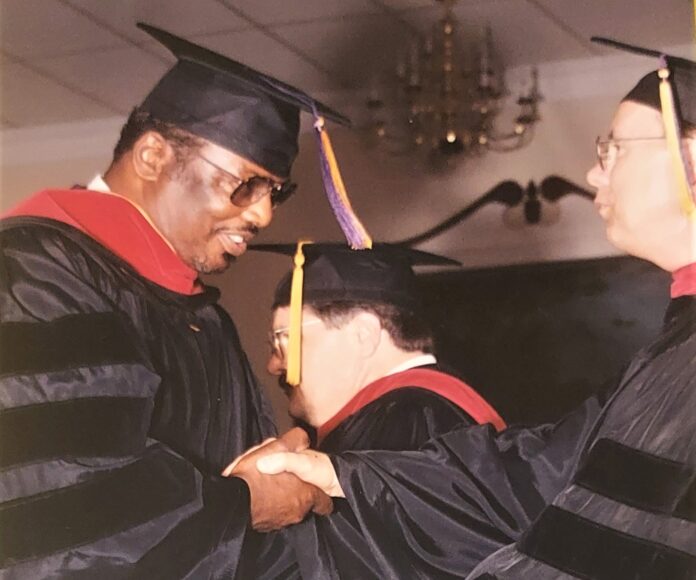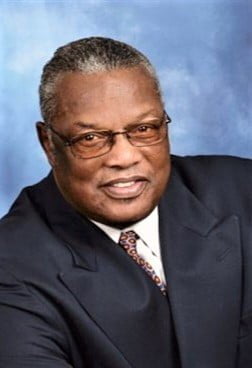

As a groundbreaking and outspoken activist for racial equality, the Rev. Dr. Alvin H. Smith Sr. has added his name to the storied pages of Tennessee’s Black History.
Dr. Smith, a Black minister who had served on the staff of the United Methodist Center in Chattanooga, was in June of 1981 appointed associate pastor at the predominately white Edgehill United Methodist Church, located in the Scarritt-Peabody-Vanderbilt area of Nashville.
With Dr. Smith’s historic appointment, Edgehill became the first church in the United Methodist Tennessee Conference to receive an appointment across racial lines since the abolishment in 1968 of the denomination’s all-Black Central Jurisdiction, and one of Nashville’s first intentionally integrated churches.
The Central Jurisdiction was created in the Methodist Church merger of 1939 in order to segregate African American Methodists within the predominantly white denomination.
“Edgehill was a church that accepted homosexuals and had all kinds of ministries,” the 86-year-old Dr. Smith recalled. “I guess they wanted to start some kind of programs for Blacks as well. At that time, I was known as a community activist and my name got out there.”
When the predominately white Edgehill United Methodist Church was organized in 1966, a white minister–the deceased Rev. Bill Barnes–was appointed as its leader. Known as “the conscience of Nashville” for his civil rights, homelessness and LGBTQ+ advocacy, Rev. Barnes set out to create a racially integrated church in a city ripped apart by segregation. Rev. Barnes wanted Edgehill to have two full-time ministers–one Black and one white.
Rev. Barnes’ plans of black and white co-pastors were initially quashed by unexpected funding cuts, but the church moved forward anyway with a modest budget, surviving because of partnerships forged with Scarritt College, Vanderbilt University divinity students and a committed congregation. It took 15 long years, but in 1981, Rev. Barnes finally saw his dream become a reality with the appointment of Dr. Smith.
After being named Edgehill’s first full-time Black minister, Dr. Smith said he can recall only one problem he had with the congregation of the predominately white church.
“The first time they asked me to pray, you know how we Black folks pray and we always say ‘our Father,”‘ he explained. “Well, when I got through praying, they jumped me. They told me, ‘You can’t say father unless you say mother, too.'”
“Boy, that was a dilemma,” he said with a laugh.
Dr. Smith was born on Nov. 19, 1936, in Chattanooga.
“All generations of my family were Baptists,” he said. “I attended Orchard Knob Baptist Church from the time I was a baby, all the way until I finished high school.”
Dr. Smith graduated from Howard High School in 1955. He attended Knoxville College in Knoxville, Tenn. on a full scholarship, where he earned a Bachelor’s Degree in Physical Education and Health in 1960.
From 1960-1962, he served in the U.S. Army Medical Corps, where he was responsible for the care of approximately 200 soldiers.
Dr. Smith earned a Master of Divinity Degree from Gammon Theological Seminary in Atlanta in 1980, and a Doctorate of Ministry from Covington Theological Seminary in 1998.
Dr. Smith was a physical education teacher to special education students at Burton School in Cincinnati, Ohio from 1968-1971, and worked in that city’s recreation department.
He was employed as a guidance counselor at Chattanooga State Technical Community College from 1971-1978. During that time, he owned and operated A&M Discount Furniture & Things on Germantown Road in Chattanooga.
Dr. Smith was first ordained as a Baptist minister at Orchard Knob in Chattanooga. An opportunity to attend a United Methodist seminary led him to switch denominations, from Baptist to United Methodist.
After completing seminary, Dr. Smith served as pastor of Hurst Memorial United Methodist Church in Chattanooga from 1979-1980, before his historic appointment to Edgehill United Methodist Church in Nashville in 1981.
In 1983, Dr. Smith moved to Cookeville, Tenn. to pastor the Wright’s Chapel United Methodist Church in Cookeville, Burton’s Chapel in Algood, Tenn. and Kynett United Methodist Church in Sparta, Tenn.
Dr. Smith’s reputation as a vocal and involved community activist and beacon for inclusion gained momentum in 1983, catapulting him into the heart of one of the city’s most contentious issues at the time–a demand for businesses and individuals in the Cookeville area to hire Black workers.
“It’s economic castration, this is control of the population by economic measures,” Dr. Smith was quoted in an April 11, 1983 Cookeville newspaper article, where he urged the local business community to deal with the situation. “The solution is in the people. No one can force anyone to give someone a job. But if their consciousness is raised, maybe we can get a response to this.”
Dr. Smith lived in Bluefield, West Virginia from 1984-1989, where he served as pastor of the John Stewart United Methodist Church. While in Bluefield, he became active in the Mercer County Chapter of the NAACP, and was named a Mercer County Economic Opportunity Corporation Board member.
In 1985, he unsuccessfully ran as a candidate for a seat on the Bluefield City Board of Directors.
Dr. Smith was quoted in a May 29, 1989 Bluefield newspaper article as saying that he would never stop advocating for change.
“I’ll always continue to do that whatever community I go to–affect some kind of change,” he said. “I can’t turn over all the stones. But I feel if I can turn over one stone, and someone else can turn over another stone, eventually something will happen.”
In May of 1989, Dr. Smith moved back to Chattanooga to pastor Stanley United Methodist Church on Dodson Avenue. A few years later, he was appointed to lead Lennon-Seney United Methodist Church in Knoxville.
In 1998, Dr. Smith retired from Lennon-Seney. He and his wife of 25 years, Johnnie, currently live in Knoxville.
As he reflected on his long and trailblazing career of ministry and amplifying the voices of those not equally heard, Dr. Smith summed up his legacy in a simple and humble statement.
“Everywhere I went, I did alright,” he said.
